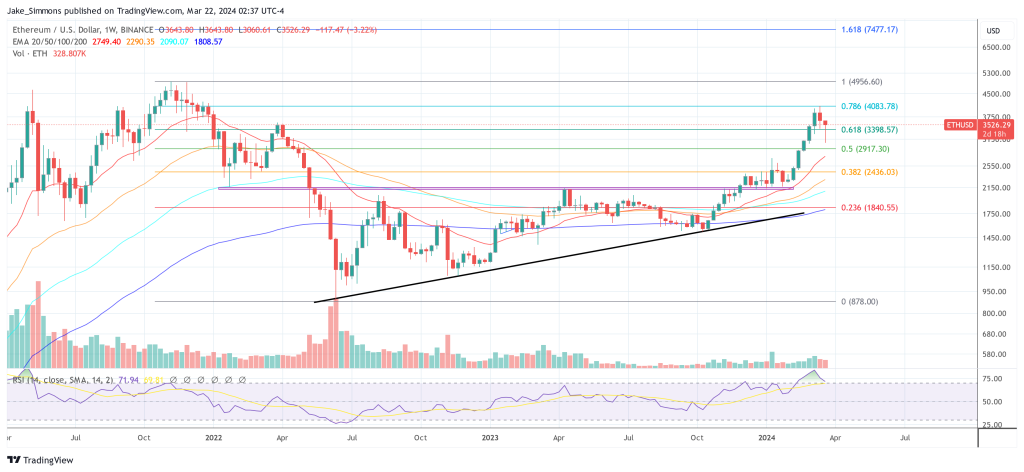Crypto Lawyer Uncovers Reasons For Ethereum Probe By SEC

[ad_1]
Scott Johnsson, a finance lawyer and general partner at Van Buren Capital, provided a nuanced analysis of the Securities and Exchange Commission’s (SEC) motivations for launching an investigation into Ethereum and the Ethereum Foundation. His insights, shared via X on March 22, offer a deep dive into the potential motivations for the agency to probe the Swiss based Ethereum Foundation.
Johnsson began by highlighting the profound market reliance on Ethereum’s classification as a non-security, a stance historically acknowledged by the SEC and other regulatory bodies. He stressed the importance of this classification for the functioning of various market mechanisms, stating:
Paul [Grewal, Coinbase CLO] gives a good overview on the SEC’s historical acknowledgements re: ETH non-security status. This is the current landscape that the market has relied on – including the CFTC, CME, ETFs, exchanges, and investors. Reliance interests are incredibly high.
Is Thwarting The Spot Ethereum ETFs The Main Goal?
A key aspect of Johnsson’s analysis revolves around the SEC’s potential motives for reconsidering Ethereum’s status at this particular juncture. He suggests that the regulatory body is navigating a complex landscape, balancing the need to enforce securities laws with the market’s reliance on existing classifications.
“Beyond simple anti-crypto animus, it’s worth thinking about why the SEC is choosing this moment to potentially reassess ETH’s status as non-security and what may be specifically motivating them. Motive meets opportunity,” Johnsson elaborates.
He further speculates on the SEC’s strategy regarding ETH spot Exchange-Traded Funds (ETFs) and its broader implications: “My view, and there are other reasonable takes, is that the SEC needs a non-correlation objection to deny ETH spot ETFs this year and has a desire to avoid undermining the args in the CB/Binance actions – together representing the two biggest crypto issues the agency is managing.”
Johnsson points out the inherent challenges in the SEC’s path, particularly maintaining a consistent approach to crypto regulation so as not to prejudice its own arguments in the cases against Coinbase and Binance. He notes, “And if the SEC learned anything from BTC ETFs, it’s to be very careful in the reasoning provided in denials and specifically that it form a coherent whole across similar orders. Grayscale won because the SEC made logical errors when approving futures and denying spot across time.”
The finance lawyer also delves into the technicalities of correlation analysis, a pivotal factor in the SEC’s decision-making process for ETF approvals. He explains, “Using the methodology I believe the SEC will rely, CME futures:spot correlation is INCREASING and the most recent periods are mostly within an acceptable range (i.e., aligning with BTC approval levels). At least based on internally run calcs.” Therefore, the SEC cannot reject a spot ETF on this basis.
Johnsson underscores the SEC’s delicate balancing act, which cannot question its previous decisions, but at the same time has to deny spot ETH ETF to satisfy its backers. He articulates, “This kills a few birds: 1) bolsters credibility for CB/Binance args, 2) denies spot ETH ETF with 2025 optionality and 3) satisfies Gary’s backers. All while avoiding (for now) blowing up CME futures, an interagency fight and invalidating futures ETFs (miring SEC in litigation).”
Earlier this month, Democratic Senators Jack Reed and Laphonza Butler called on SEC Chairman Gary Gensler to halt the approval of additional spot crypto ETFs. Senator Elizabeth Warren has also expressed strong criticism of these financial products. Last year, Butler endorsed Senator Elizabeth Warren’s contentious Digital Asset Anti-Money Laundering Act by co-sponsoring the bill.
At press time, ETH traded at $3,526.

Featured image created with DALL·E, chart from TradingView.com
[ad_2]
Source link
